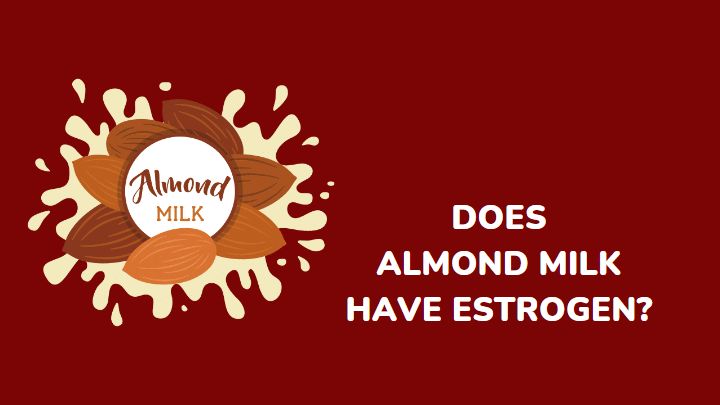There are claims that almond milk is a source of estrogen and can affect estrogen levels.
How true is that? The answer to that question is in this article. This belief has spurred many people – who want to boost their estrogen levels – to take this tree nut milk as a source of the hormone, estrogen.
So, as plant-based milk, does almond milk have estrogen? How well does almond milk increase estrogen levels? Are there side effects to watch out for if you’re drinking almond milk for estrogen? Keep reading to see answers to these questions.
Does almond milk have estrogen?
No, it does not. Almond milk has phytoestrogens – plant-based estrogens – which may act like estrogen but with negligible effects.
Phytoestrogens have a chemical structure that resembles that of human estrogen. This phytoestrogen is the same compound in soybeans, flaxseeds, and peanuts.
These phytoestrogens mimic estrogen, and your body may respond to them as though they were human estrogen. Also, these phytoestrogens may block estrogen receptor sites and prevent the actual estrogen from binding.
However, these plant-based estrogens do not affect your health positively or negatively, even though they may act as anti-estrogen.
Does almond milk have hormones?
No, it does not. Almond milk does not contain any hormones.
Instead, it is filled with vitamins and minerals necessary for healthy functioning. Other ingredients in almond milk may include sweeteners, thickeners, and stabilizers which are not hormones.
Is almond milk good for you?
Yes, it is.
Almond milk is a rich source of vitamin E, phosphorus, manganese, magnesium, iron, copper, and calcium. Vitamin E is a powerful antioxidant that helps to neutralize the effects of free radicals that can cause cancer and heart disease.
Natural, unsweetened almond milk is low in calories and sugar. This makes it healthy for people looking to control their sugar levels and weight. The vitamins and minerals can also help strengthen your bones and muscles.
In addition, almond milk contains fiber which is good for digestive health. It is also a better alternative to dairy milk for vegans and people with dairy allergies.
Who should not drink almond milk?
People who have a tree nut allergy should not drink almond milk.
Also, if you are at risk of vitamin D deficiency, you may want to avoid almond milk or go for commercial almond milk, which contains artificial vitamin D.
Are there side effects to drinking almond milk?
Yes, there are.
Too much consumption of commercial almond milk can cause diarrhea and may worsen gastritis.
Commercial almond milk contains additives like carrageenan, vitamin D2, vitamin A palmitate, and sugar, which are not completely healthy.
While these ingredients improve the taste and quality of the milk, they can be harmful to your health. But if you can make homemade almond milk, you can avoid these side effects.
Is almond milk better than cow milk?
Almond milk is not better than cow milk, nor the other way around.
In comparison, natural almond milk contains fewer calories and less protein and fat than cow milk. On the other hand, cow milk has more protein, vitamins, and minerals.
In addition, manufacturers of commercial almond milk add additives and calcium to make the milk sweeter, more flavorful and look more like cow’s milk.
But these additives may be harmful to your health, and you may not be able to absorb a lot of the calcium. Therefore, the milk you choose to take is mainly influenced by what you expect to get.
For instance, almond milk is a better option for vegans and people looking to control their weight. But cow milk is a richer source of protein, vitamins, and minerals.
How to increase estrogen levels
Eating foods and fruits that are rich in estrogen can help increase estrogen levels. Also, certain lifestyle changes can help. Here are some of the things you can do:
- Eat soy-based foods (tofu, tempeh, and edamame), flaxseeds, sesame seeds, peaches, dried fruits, garlic, cashew nuts, almonds, peanuts, berries, wheat bran, and cruciferous vegetables
- Make lifestyle changes like keeping a healthy weight, getting enough sleep, exercising regularly, and cutting down on stress
- You can also go through hormone replacement therapy (HT) by taking estrogen supplements
- Take vitamins and minerals like the B vitamins, vitamin D, and boron
- Additionally, use herbal supplements like chaste berry, red clover, evening primrose oil, and black cohosh
FAQs
Does almond milk contain hormones?
Almond milk does not contain hormones.
Phytoestrogens do not have any hormonal influence on the body. But drinking almond milk can be good for hormonal imbalance because of the nutrients it contains and not because it affects hormones.
Is almond milk healthier than oat milk?
Your choice of plant-based milk depends on your diet preferences and what you hope to get from the milk.
Oat milk and almond milk are two different plant-based kinds of milk that are healthy for a vegan diet.
However, oat milk contains more carbs and proteins, while almond milk is low in calories.
Can you drink almond milk every day?
Yes, you can drink almond milk every day, if you’re not allergic to almonds.
It is also safer to include homemade almond milk in your daily diet, unlike commercial almond milk. Store-bought almond milk contains additives that can cause diarrhea if you drink too much of it.
Conclusion
Almond milk is a type of plant-based milk, and it does not contain estrogen. It contains phytoestrogens which are plant-based estrogens.
When you drink almond milk, the phytoestrogens may either act as anti-estrogen or block estrogen from binding to estrogen receptors.
The bottom line is that almond milk does not contain estrogen. Almond milk does not contain any hormones too. So, drink the milk for the many other benefits instead of as a source of estrogen.
Thanks for reading.
Visit Millenora to read articles that provide the nutritional value of your food, drink, and beverages.

